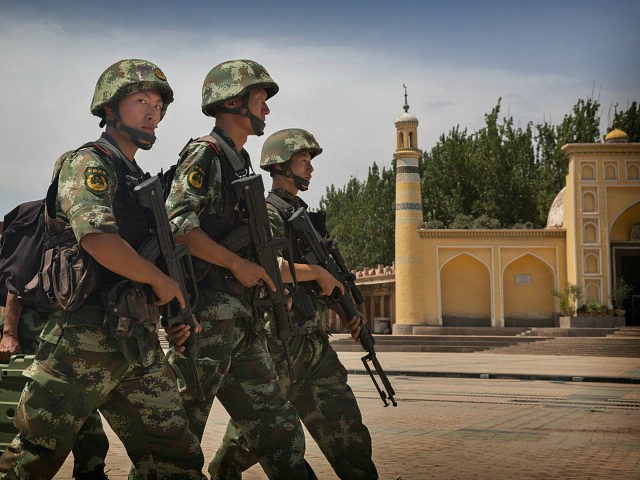Police killed three armed “thugs” in China’s western Xinjiang province this week after the still-unnamed suspects stabbed five people to death and injured five others. Chinese officials have yet to identify their motive, though the incident occurred in a region known to host a violent Muslim separatist movement.
According to the Chinese state-run Global Times, the government of Hotan prefecture in Xinjiang neutralized the attackers to complete the attack. The newspaper does not name the individuals in question or offer any suggestion as to why the attack occurred, instead noting that the area has long attracted terrorists. The Times notes that the Communist Party had fired multiple high-level officials in Hotan in response to previous terrorist attacks.
Other outlets have managed to add little to the picture the official government version of the story paints. The Agence France-Presse reported that the Chinese government had arrested six individuals believed to have ties with the attackers killed this week. Two of those are members of the ethnic Uighur minority, which is the majority ethnic group in Xinjiang. Most Uighurs are Muslims and, in Xinjiang, do not speak Mandarin, which China has been working to impose as the national language in the sweeping, multi-ethnic nation.
AFP reports that Uighur activists fear the attack will give Chinese officials an excuse to crack down on members of their ethnicity who seek to practice their faith and speak their language openly. “I am worried the case will provide China with a new political excuse for repression and will cause more people to face discriminatory inspections or detentions,” World Uyghur Congress spokesman Dilxat Raxit told the newswire service.
Raxit’s report that police are investigating ethnic Uighurs for any ties to the terrorists echoes the South China Morning Post, which states that police presence throughout Pishan, the county in Hotan where the attack took place, has increased significantly this week. “Armed police in bulletproof proof vests are on patrol every 10 to 20 metres on the streets of Pishan county,” the Post reports, citing local sources.
“At present, social order is normal at the site, society is stable, and investigation work is under way,” the local government said in an official statement.
The attack returns the spotlight of China’s regional war on terror to Xinjiang where Beijing has strived to contain the influence of local Muslim Uighur culture. Uighurs are ethnically Turkic, and their culture differs significantly from the majority Han Chinese.
While Beijing does have a low tolerance for open displays of religiosity, it has encouraged the practice of Islam among the ethnic Hui in the center of the country, suggesting that separatism is as much to blame for their opposition to Islam in Xinjiang a the religion itself. Xinjiang is home to a radical Islamic terrorist group called the East Turkestan Islamic Movement (ETIM). China has also claimed hundreds of Xinjiang residents have left the country to join the Islamic State in the Middle East.
Shortly before the attack, the Global Times ran a piece praising local authorities for arresting seven individuals for “spreading extremist and illegal content online,” detailing the crimes as sharing “pro-terrorist content… publicizing religious extremism… spreading fake reports of terrorism and… a hostile attack on governmental measures of stabilization.” The report did not specify what kind of religious or terrorist content.
Beijing has spent years attempting to limit the influence of Uighur culture in the region. Chinese Communist Party officials cannot legally observe the Ramadan fast in the region, and individuals wearing long beards or identifiable Islamic garb are banned from using public transportation. Shops in the region must legally sell multiple brands of alcohol and cigarettes, both haram under sharia law –- a measure the Chinese government claimed was meant to weaken the practice of Islam in Xinjiang.

COMMENTS
Please let us know if you're having issues with commenting.